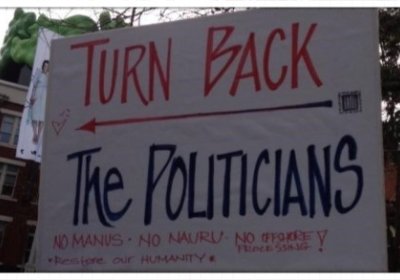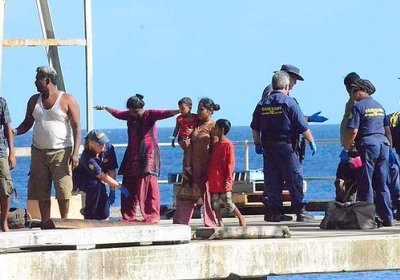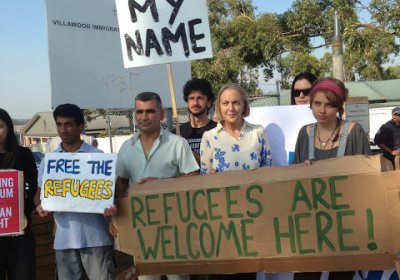Immigration minister Scott Morrison has spun many lies in his role as “border protector”. They have come hard and fast as the government tries to deal with the 157 Tamil refugees kept at sea aboard a Customs ship for weeks.
Below are the four biggest lies that have underpinned this case and the Coalition's entire anti-refugee policy.
WHY THE BOAT WAS BROUGHT TO THE MAINLAND
Morrison said on July 26 the 157 people would be brought to Curtin detention centre in remote north-west Western Australia so identity checks could be carried out by Indian officials.
Jay Fletcher
The case of 153 asylum seekers from Sri Lanka taken into Australian custody at sea returned to the High Court on July 18. Due to government secrecy, court proceedings have so far been the only reliable source of information about what is happening to the group.
Documents submitted to the High Court on July 17 revealed further details about the conditions in which 153 Tamil asylum seekers are being held. Lawyers representing 86 of those taken aboard an Australian Customs ship but not brought to Australia say the asylum seekers have not been able to make any formal refugee claims.
The “incommunicado detention without judicial scrutiny” of 153 Tamil asylum seekers has turned the world's eyes on Australia's refugee policy and brought many questions into the spotlight.
The first question was raised by 53 international law scholars from 17 Australian universities, who released a statement after the government revealed it had handed over 41 passengers of an asylum boat to the Sri Lankan navy.
Nine days before the Senate changeover, the High Court ruled that immigration minister Scott Morrison’s cap on the number of protection visas he could grant was invalid.
In March, using his arbitrary ministerial powers, Morrison limited the maximum number of protection visas to be granted in the financial year to 2773 — the exact number already given. This was in response to Labor and the Greens uniting in the Senate to block the reintroduction of temporary protection visas (TPVs).
More than half a million Iraqis have been displaced and hundreds killed after the fall of Iraq's second largest city of Mosul to Islamic fundamentalists. But even as the crisis in Iraq dramatically worsens, Australia is refusing to offer any reprieve for the thousands of Iraqi refugees in its care.
World Refugee Day is dedicated each year to raising awareness about the more than 43.7 million refugees and internally displaced people around the world. The United Nations and non-government organisations usually share refugee stories and make pleas for compassion and empathy.
But in Australia, refugees and asylum seekers are treated like the enemy in a war: the target of a highly resourced, military-led “deterrence” strategy complete with arbitrary detainment, detention camps, guards to terrorise them, forced deportations and the violent suppression of those who protest.
The Australian government’s review of the February violence on Manus Island leaves critical questions unanswered and does not call for the detention camp to be closed.
Robert Cornall’s 107-page administrative review, released on May 26, includes a detailed account of 23-year-old Reza Berati’s death and identifies a Salvation Army employee as instigating the attack.
For years the federal budget has been brutal on refugees and asylum seekers. Each year for the past two decades, visa places have been cut or made more difficult to gain, and services and rights to appeal are cut. The rights of people seeking protection in Australia are slowly eroded while detention centres get bigger and bigger budgets.
Now, Prime Minister Tony Abbott and Treasurer Joe Hockey have revealed a budget that takes the war on refugees to new heights — with a newly merged border control agency, more patrol boats and the axing of independent oversight of refugee processing.
Iranian asylum seeker and aspiring architect Reza Berati was beaten to death inside the Manus Island detention camp more than two months ago, during what former employees of the detention centre described as “inevitable bloodshed”.
Now, the five witnesses who say they can identify those who allegedly kicked, punched and beat the 23-year-old until he succumbed to massive head injuries, have been receiving death threats from local security guards.
The former Labor government tried and failed with its ill-conceived "people swap" deal with Malaysia in 2011. Now, the Tony Abbott government has said it may try a resettlement deal with the even poorer nation of Cambodia.
After talks with foreign minister Julie Bishop in February, her counterpart, Hor Namhong, said Cambodia was considering an offer to resettle refugees from Australia. Immigration minister Scott Morrison visited Cambodia again this month, to discuss "regional cooperation to deal with asylum seeker movement".
Asylum seekers claiming automatic protection after the immigration department accidently leaked their identities online in February are being transferred to the other side of the country before their case returns to court.
Buses were at the gates of Villawood detention centre early on the mornings of April 3 and 5, as refugee rights advocates including Greens Senator Lee Rhiannon held a protest against their removal outside. Asylum seekers held a sit in protest inside the centre and were trying to refuse to board.
Australian Prime Minister Tony Abbott has defended Papua New Guinea's efforts to shut down at least two legal inquiries into the treatment of asylum seekers in the Manus Island detention centre, after the violence that left one man dead and scores injured.
A PNG National Court judge, Justice David Cannings, announced early last month he would hold an independent inquiry into the conditions in the centre, and determine whether asylum seekers' human rights were being upheld under the country's constitution.
- Previous page
- Page 3
- Next page










